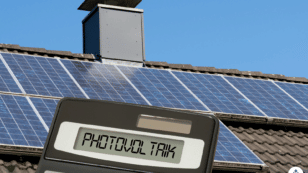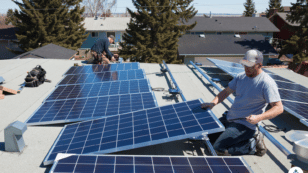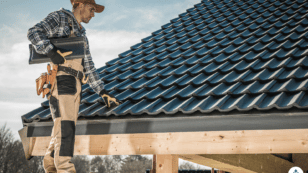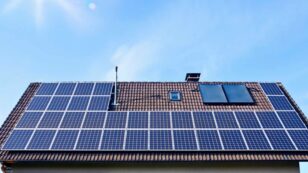

Top 5 Best Solar Panels for Boats (2024 Marine Buyer’s Guide)
In this guide, you’ll learn:
- Why photovoltaic (PV) equipment is great to have on your boat
- Which panels are best suited for use on the water
- What qualities make for a great boat solar panel
Each product and or company featured here has been independently selected by the writer. You can learn more about our review methodology here. If you make a purchase using the links included, we may earn commission.
Why Should You Install Solar Panels On Your Boat?
Before we dive into the best panels to bring your boat into the world of clean energy, it’s worth discussing why you’d want a solar panel system on your boat in the first place.
There are a few use cases that are important to consider. These not only dictate whether or not you need panels on your boat, but they can also help you decide which system is the best and most cost-effective for you. We’ll discuss the different reasons to go solar on your boat below.

Blue Raven Solar
Pros
- Industry-leading in-house financing
- Competitive pricing
- Excellent reputation
Cons
- Doesn't offer solar batteries (coming 2022)

Blue Raven Solar
Pros
- Industry-leading in-house financing
- Competitive pricing
- Excellent reputation
Cons
- Doesn't offer solar batteries (coming 2022)
Charging Emergency Equipment
For anyone who has run into issues out at sea, the need for reliable emergency equipment is well understood. Whether you run out of gas, your boat breaks down or you have some other issue that precludes you from getting back to shore, having a way to reach out for help will keep your mind at ease.
Depending on the type of boat you have and how well it’s equipped, you may have a radio system, a satellite phone, a regular phone or some other communication device for emergencies. All of these require power, and having a solar system on your boat ensures that you’ll always have access to these devices.
Charging Recreational Equipment
Even if you’re not running into problems at sea, you might want the ability to charge recreational equipment. It’s always nice to have the ability to charge smartphones, e-readers, speakers and other devices you might use for entertainment.
This is especially important if you plan on spending a few days at sea and don’t want to rely on your boat’s batteries. Keeping those well charged for lighting, navigation tools and starting your boat’s engine is more important than getting your phone up to a full charge.
Quality of Life at Sea
For a lot of people, there’s a lot of joy in upgrading life at sea and making things just a little more comfortable. One of the perks of installing a solar system on your vessel is that you don’t have to worry about using your boat’s batteries for non-necessities.
For example, many recreational boaters connect their solar array to an electric cooler. Others use their solar modules to power electric water heaters for hot showers and constant hot water.
The possibilities for improving your at-sea experience with solar are really up to you, which is part of what makes bringing renewable energy to your boat so exciting.
What Are the Top 5 Best Solar Panels for Boats?
If you’re convinced you want to install solar on your boat, but you don’t know much about the available options, you might be overwhelmed by the choices. You’ll have access to seemingly countless brands and models.
To help you narrow down your options and choose panels that will meet your needs, we’ve done extensive research and chosen just a few product lines that we recommend. We’ll provide a quick breakdown of the different options below, and we’ll dive deeper into the specifications in later sections.
| SunPower 170W Solar Panel | Renogy 100W Flexible Marine Solar Panel | EcoWorthy 25W Solar Kit | NewPowa 30W Solar Kit | TopSolar Solar Kit | |
| EcoWatch Opinion | Best Overall | Best Value | Easiest Installation | Great Budget Option | Best Starter Kit for Backup Energy |
| Power Output | 170 watts | 100 watts | 25 watts | 30 watts | 20 watts |
| Price | $399 | $220 | $42 | $60 | $50 |
| Equipment Included | Solar panel only | Solar panel, controller and wiring | Solar panel, controller and wiring | Solar panel, controller and wiring | Solar panel, controller and wiring |
| Relative ConversionEfficiency | High | Above Average | Low | Average | Average |
| Waterproof Rating (Ingress Protection [IP]) | IP67 | IP67 | IP65 | IP67 | N/A (noted to be waterproof) |
SunPower 170W Solar Panel
SunPower is a leader in the residential solar industry, so it’s no surprise that we found that the company also makes the best solar panels for use on boats.
This panel is pricey, but it’s significantly more powerful than most other options. At 170 watts, you can use these panels to charge your boat’s main battery, provide backup power for emergencies, or live large on the water by powering coolers, hot water heaters and much more.
This panel doesn’t come with a solar charge controller like many other options do, so not only is it expensive, but you’ll have to lay out more money for a controller, inverter and battery. However, we believe the efficiency and power output are well worth the investment.
These panels are also rated with a waterproof rating of IP67, which means they can withstand immersion in water up to about three feet for around half an hour. If you need more protection than that, you have bigger problems on your hands than losing a panel.
Pros
- High-efficiency panel for maximum power
- High-quality, durable materials
- Trusted and reliable brand
- Waterproof up to a meter for 30 minutes
Cons
- Expensive
- Doesn’t include any equipment other than the panel
Renogy 100W Flexible Marine Solar Panel
The Renogy Flexible solar panel designed specifically for use on the water is our pick for the best bang for your buck. It’s about half the price of the SunPower panel, although it does have a little more than just half the power capacity.
At 100 watts, this panel is great for middle-of-the-road power. It can serve as a reliable backup source of energy, or you can use it to recharge phones, GPS devices, e-readers, laptops and other electronics. It’s possible to use it for the quality-of-life items mentioned above as well.
This panel also has an IP67 waterproof rating, which is ideal for maintaining peace of mind on the water. Although it’s less expensive than our top pick, it includes a controller and wiring to connect your panels. You’ll just need an inverter and a battery to complete your setup.
Pros
- Excellent power output
- IP67 waterproof rating
- Includes controller and wiring
- Reliable brand name
Cons
- More expensive than many other options
- Doesn’t include a battery or inverter
EcoWorthy 25W Solar Panel Kit
The EcoWorthy solar panel kit is one of the easiest photovoltaic (PV) systems to install, so it’s our top pick for those looking to get started with clean energy. You can purchase this kit with a 10 amp-hour (AH), 12-volt battery, and the MC4 connectors are plug-and-play for a quick and painless installation.
This panel has a much smaller output than our top two picks, so it’s best reserved for backup power or for charging cell phones and other small electronics.
This kit has a waterproof rating of IP65, which means it can withstand being submerged in around five feet of water for up to a half hour, and it will also be protected from sprays of water. This is a great option for maintaining peace of mind when you’re on the water, especially if conditions are rough.
Lastly, the kit includes a panel, a controller and wiring, so you’ll just need to add a battery and an inverter to complete your kit.
Pros
- IP65 waterproof rating
- Includes a controller and wiring
- Very affordable
Cons
- Doesn’t include a battery or inverter
- Significantly less power than our top picks – Only ideal for light-duty use
NewPowa 30W Solar Panel Kit
This 30 watt solar panel kit from NewPowa includes a panel, a controller and wiring. If you add a backup battery and an inverter, you can create a complete off-grid solar kit for less than $150 without leaving your home (thanks to Amazon).
With an output of 30 watts, this is the best marine solar panel for light-duty use, although you could use it for non-essential electronics like an electric cooler or a small solar water heater. Those more demanding devices should be low-use, though.
The panels and controller are IP67-rated, so they’re suitable for use on just about any boat.
Best of all, the partial solar kit is just $60, so this makes our list as our top budget pick for going solar without breaking the bank.
The kit has pre-drilled mounting holes and is compatible with a wide variety of mounting brackets. As such, your installation process should be relatively straightforward.
Pros
- Affordable
- IP67 waterproof rating
- Includes a controller and plug-and-play wiring
Cons
- Relatively low wattage
- Doesn’t include a battery or inverter
TopSolar Monocrystalline Solar Panel Kit
The off-grid solar kit from TopSolar is a great affordable option, and it’s what we’d recommend as a starter kit for backup energy for beginners. It only puts out 20 watts, so this is not the best option if you’re looking for something to charge your recreational devices or quality-of-life equipment. However, it’s an affordable and easy-to-install kit for emergency power.
Unfortunately, this kit doesn’t include a specific ingress protection (IP) rating, but the manufacturer does note that the product is waterproof. Based on customer reviews, it appears that this product is safe for use on the water.
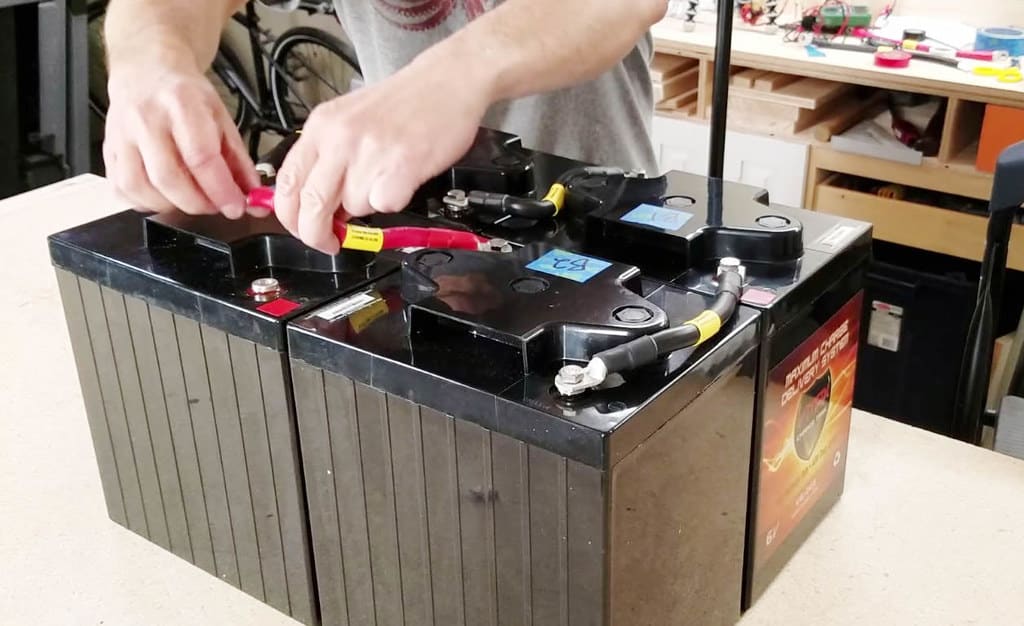
The kit includes a small PV panel, a controller and wiring, so you’ll need to buy an inverter and battery separately if you want AC power or backup power.
Best of all, the kit is super easy to install. It has pre-drilled holes and is compatible with most mounting brackets and clips.
Pros
- Affordable
- Great option for backup power
- Easy to install
- Includes a controller and wiring
Cons
- Doesn’t include a battery or inverter
- No official IP rating
- Low wattage
What Should Boat Owners Look for When Buying Solar Panels?
Solar panels can be a great option for marine use, but not all panels and solar kits are suitable for use around water. Additionally, the panel you choose needs to be selected based on how you want to use your solar power system.
In the sections below, we’ll include a few key things you’ll want to consider when choosing a solar module for your boat.
Energy Needs
One of the first things we recommend thinking about is how much energy you need your panels to generate. This will help guide you to what size panel and how much energy output you need.
If you’re just looking for reliable backup power for your boat’s internal 12-volt battery, or you want your panels to provide power for emergencies only, you’ll probably only need a panel of around 20 watts.
If you use your boat frequently for entertaining guests, or you spend days at a time on your boat, you might want something above 100 watts to provide backup power plus electricity for electric coolers, water heaters and more. Consider everything you’ll use your solar array for and size your system accordingly.
The chart below provides a quick breakdown of what size solar panels you need for different purposes on a boat.
| Device/Use | Running Watts Required for Power |
| Single LED light | 3 watts |
| Phone charger | 10 watts |
| Backup battery for boat | 20 watts |
| Small electric fan | 50 watts |
| Electric cooler | 100 watts |
| High-end speaker system | 100 watts |
| Small solar water heater | 100 to 150 watts |
| Laptop charger | 125 watts |
If you plan on using your panels to replace an on-board generator, you can calculate how much electricity your boat uses and then size your system accordingly. It’s always advisable to go a little bigger than you think you need, as cloud coverage and the angle of the sunlight hitting your panels can cause fluctuations in solar power production.
If you have high energy needs, we also recommend considering a Maximum Power Point Tracker (MPPT) controller, which is more efficient than a Pulse Width Modulation (PWM) controller, which is more common.
Space Available for Installation
Just like residential solar systems are limited by available roof square footage, marine solar systems are limited by the available space for installation. This is an important consideration to make to ensure you don’t buy a panel that you won’t be able to mount or use in your vessel.
Before you buy any equipment, we recommend checking the measurements of the panel and deciding where on your boat you can install it. Some portable, foldable panels come with kickstands for temporary setups, but the smaller of our top picks can be set up just about anywhere without mounting brackets as well.
Type of Solar Panel
You’ll have a few choices for the type of panel you purchase for your boat as well.
First, you’ll need to decide between thin-film solar panels, polycrystalline solar panels and monocrystalline solar panels.
- Monocrystalline panels are the most efficient, so they’re the best suited for use on boats. The higher efficiency ratings will let you produce more energy per square foot, which is essential on a boat where space is limited. All of our recommendations above are monocrystalline.
- Polycrystalline solar panels can also work, but they won’t provide as much solar power.
- Thin-film panels are the most affordable, but they generate even less electricity and aren’t ideal for use where available space is minimal.
Second, you should think about whether you want a rigid solar panel with an aluminum frame or a semi-flexible one. Flexible panels contain special solar cells that can be a bit pricier, but they’re easier to install and are a bit more versatile. They can be mounted on curved surfaces, giving you more placement options.
Waterproof Rating
Since you’ll be using your panels on the water, it’s essential that you choose one with a good waterproof rating. Some of the best options are IP67 and IP65. These will ensure your panels and charge controllers or regulators remain safe and at low risk of fire even when exposed to moisture and direct water contact.
Accessories
Finally, you should consider what your kit comes with. Some come with only panels, so you’ll need to buy a controller, an inverter and a battery to complete your setup. Some come with a combination of these parts, although batteries and inverters aren’t commonly included. Some panels also include mounting brackets, although this is also uncommon.
Thinking about the additional equipment you’ll need to purchase after buying your panels will help you budget more effectively for your entire system.
How Do Solar Panels Work With Boats?
PV panels for boats work just like panels for residential use — they collect sunlight and route the energy either to a storage or use system.
Since boat solar systems are entirely off-grid, most require the following:
- Solar panels
- A charge controller
- An inverter
- Mounting brackets or other mounting hardware
- A backup battery for energy storage
We’ll explain what each of these components does in the section below, and then we’ll get into how to set up and maintain your system.
Equipment for a Marine Solar System
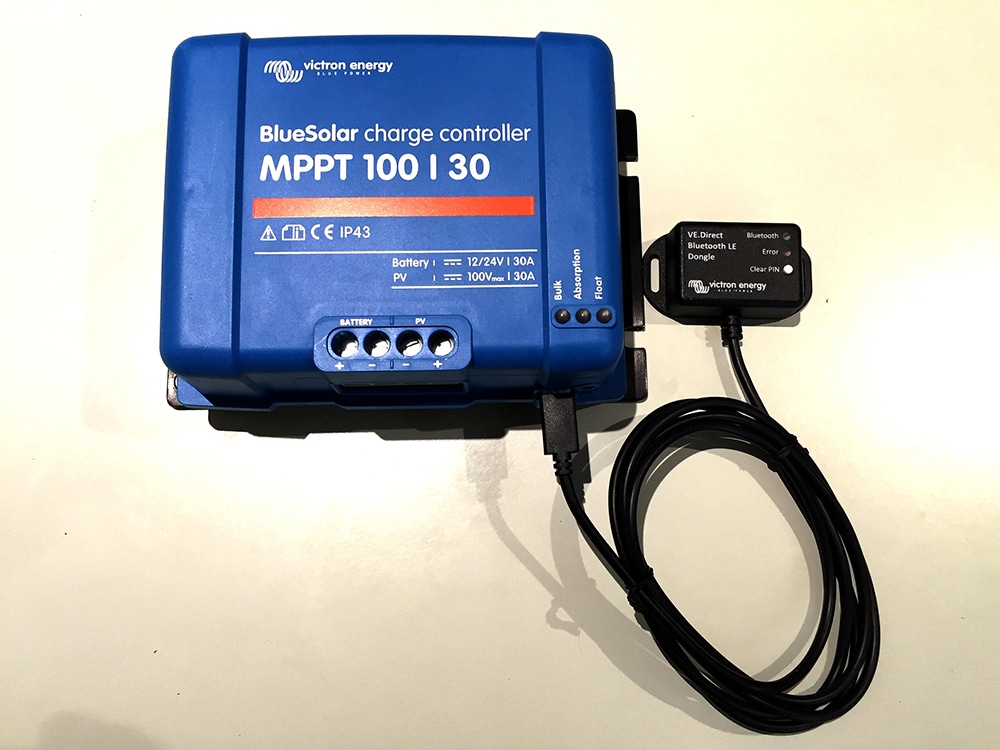
The main components you’ll absolutely need for your boat solar system are PV panels and a controller. If you plan to store energy or use it to charge common electronics, you’ll also need a battery and an inverter.
The panels are the pieces of the system that collect energy from the sun. The electricity generated is then passed to your controller, which limits the amount of power that flows through the wires to your battery or device.
The charge controller helps prevent overcharging batteries or electronics when production is high, and it also prevents battery drainage when production is low. Some panels are equipped with bypass diodes to provide the same safety features.
The solar energy that’s collected is direct current (DC), while most electronics, including standard light fixtures, use alternating current (AC) power. An inverter is used to convert DC current to AC so that you can use your solar power to power devices directly. If you don’t have DC lights in your boat, for example, an inverter might be necessary to provide lighting.
A battery storage system is exactly what it sounds like: it’s a battery bank that stores solar energy for later use.
Solar batteries are useful for two main reasons on boats.
- First, if you ever experience cloudy days, your solar production might very well drop below what you need to provide power to your devices. In that case, having a battery to pull stored energy from can be helpful in maintaining charging capability or electricity.
- Additionally, a battery on board can be useful for maintaining backup power for emergencies. If your boat’s built-in battery ever fails or you need to charge emergency communication or navigation devices, a battery will come in handy.
Installation
Since you want your solar panels to be exposed to as much sun as possible, it’s best to install them at or near the highest point on your boat — often the bimini. This will prevent them from getting shade from other parts of your boat during the day, regardless of which direction your vessel is moving.
It’s also typically best to install your panels as close to parallel with the surface of the earth as possible. Since your boat will be moving around a lot, it’s not realistic to install them facing the path of the sun in the sky as you would on a home. Laying them flat gives you the best chance of always collecting at least some sunlight.
You, of course, need to consider available space as well, so remember to take measurements of your installation site and compare them to your panels before beginning the process.
Finally, you should consider where your batteries will be — if applicable — and where your wiring will run once your installation is complete. Keeping these things in mind will help ensure that the installation process goes as smoothly as possible.
Below, we’ll include a brief step-by-step guide on how to install a solar system on your boat.
- First, take measurements of where your panels will be installed, the path the wiring will take to all components and where your battery, inverter and controller will be placed. Making sure you have enough room for all of your components will help avoid headaches once you get started.
- We recommend mounting your batteries, inverter and controller first. These are generally the easier components to mount, so they’re the easiest to move once installed.
- Next, mount your panels. The process for this will depend on the panels you choose and where you plan to install them. You should follow the installation instructions for the mounting brackets or hardware you purchase.
- Finally, you can wire your system, beginning with the connection between the panels and the controller and then the connections to the inverter and battery.
- You can test your system by using a voltmeter or by checking to see if your powered devices function as intended. Some controllers will also show you if your panels are providing energy and how much they’re producing.
For more guidance and information on how to set up your boat solar system, you can check out the video below:
Maintenance
Thankfully, solar systems are relatively maintenance-free once installed, although you should carry out routine system checks and cleaning to ensure you continue to enjoy maximum safety and energy production.
You should spray down your panels with water about once every six months to get any accumulation of dirt or salt off of them. This will help maximize energy generation. Around the same time, you should also check the wires and connectors for corrosion, which is more likely to occur if you use your boat in saltwater.
After major storms, it’s a good idea to ensure that none of the connections between components were lost. A simple disconnect could lead to your battery charging issues, which could be an issue if you ever need backup power.
Lastly, it’s worth mentioning that solar systems on boats are generally considered safe. There is a small risk of fire but provided you carry out the proper maintenance, you should avoid any serious issues.
Are Marine Solar Panels Worth It?
The answer to this question really depends on who you ask. For some boat owners, PV panels are essential. Not only can they provide backup power for emergencies, but they can also improve your quality of life at sea and the enjoyment of your boat.
For many people, these things are indispensable, so solar systems are well worth the investment. For certain types of boats — like small fishing boats and sailboats — solar panels will be the only source of electricity.
Other boat owners feel comfortable relying on generators if they have them, and some use their boats only for short durations, which makes having an on-board solar array less valuable.
For most people, though, having at least a small solar system to provide backup power for emergencies is worthwhile. From there, opting to up the size of your system to improve your time at sea isn’t hard to get behind.
FAQ: Marine Solar Panels
Below, we’ll answer a few of the most common questions we get about solar panel systems made for boats.
In our opinion, the best solar panels for boat use are the SunPower 170W solar panels. These are flexible panels that allow for easy and versatile installation.
They are some of the most efficient panels suitable for boat use, and they provide an incredible 170 watts each. This is enough power for just about anything you need electricity for on your boat and for emergency equipment in low-light conditions.
These panels are a bit expensive, and they don’t come with any additional equipment. However, the junction boxes have a waterproof rating of IP67, come with a five-year warranty for equipment and high efficiency and are made from high-quality, durable materials for years of use.
Yes, solar panels can be hooked up to keep your boat’s 12 volt battery charged. However, you need to make sure you install a system that is sized appropriately for your boat’s needs.
You can check how much power your boat draws from its battery system by looking at the loads (in amps or watts) of each device. You can also use your battery monitor if you have one to check the energy demand of each individual component pulling power. Then, choose solar panels that produce a bit more energy than your system needs.
If you live in an area that experiences a lot of cloudy weather, you might want to size up your system even more to ensure your system generates enough electricity.
The cost to install a solar array on your boat can range from around $150 up to well over $1,000. Where in this range your total falls depends primarily on how much energy you need to produce.
If you’re looking for portable solar panels to take on and off a small boat with you for emergency use only — which is typical for sailboats and smaller boats that don’t normally have electricity — you’ll likely be looking at the $150 end of the spectrum.
If you have a much larger boat and want to be able to maintain power for your essential equipment and some non-essentials, then you’ll likely push your all-in cost closer to the higher end of the range.
Installing solar panels on your boat can provide quite a few key benefits, although the perks you’ll actually experience depend on your situation and your specific boat.
Perhaps most importantly, solar panels can charge your boat’s battery and maintain electricity for emergencies. Most systems — even small ones — can serve to charge your phone, GPS or other emergency devices in case you run into problems out on the water.
Larger systems can also provide power for recreational use, like charging phones, powering speaker systems, keeping beer cold and more.
Related Solar Panel Guides
Comparing authorized solar partners
-
- Industry-leading in-house financing
- Competitive pricing
- Excellent reputation
- Doesn't offer solar batteries (coming 2022)
A+Best Solar Financing2014Trina Solar, Canadian Solar, SolarEdge, Silfab, SunPower25-year manufacturer warranty; 10-year workmanship warranty, 2-year production guarantee
Having trouble deciding? Click below and use our process to receive multiple quotes instead:

 233k
233k  41k
41k  Subscribe
Subscribe 





